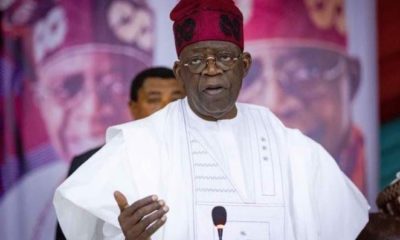Communication
Are AI ChatBots Posing A Threat To The Nigerian Economy?

Artificial Intelligence (AI) has rapidly evolved in recent years and has become increasingly integrated into various industries, including Nigeria’s economy.
One type of AI is chatbots like ChatGPT, which are becoming more common in customer service and other industries.
While AI can have numerous benefits for businesses, there are also concerns about the potential threat it could pose to the Nigerian economy.
WHAT IS CHATGPT?
ChatGPT, which is a combination of ‘Chat’ and ‘Generative Pre-Trained Transformer’ – a complex neural network based on the revolutionary attention concept – is a chatbot inaugurated in November 2022 and built on top of OpenAI’s GPT-3 family of large language models. According to its manufacturers, it has been fine-tuned using both supervised and reinforcement learning techniques.
One of the main concerns is that AI chatbots could replace human customer service representatives and other workers, resulting in job losses.
This is particularly concerning in Nigeria, where the unemployment rate is already high, and the economy is struggling to create new jobs.
If more businesses in Nigeria adopt AI chatbots, there could be a further loss of jobs and reduced opportunities for people who rely on employment in these sectors.
Additionally, there is a fear that AI chatbots could exacerbate the economic inequality in Nigeria. If businesses use AI chatbots instead of hiring human workers, it could lead to further concentration of wealth in the hands of the few who control these technologies.
This could also lead to a concentration of tech jobs in major cities, further marginalizing people in rural areas who may not have access to education or technology to take advantage of the new opportunities.
However, AI chatbots also have the potential to improve the Nigerian economy by increasing efficiency and productivity. With more efficient customer service, businesses can serve more customers in less time, leading to increased revenue and growth.
AI chatbots can also help businesses reduce costs by automating repetitive tasks, freeing up resources for other purposes.
According to a software engineer and founder/Chief Executive Officer of Clamp, a software payment solution for small businesses, Mr Kelvin Bawa, in an interview with newsmen on the 12th, of February 2023, he stated that the economic value of ChatGPT to the African tech space was immense.
He said, “While it has the potential to bring about many positive economic benefits, it is important that the potential dangers are also taken into consideration, to ensure that its use is responsible and ethical. As such, it is crucial that governments and businesses in Africa take a proactive approach to regulating and harnessing the power of AI for the good of their citizens and economies.”
Bawa, however, noted that the impact of AI in the African tech space had been significant, with ChatGPT being one of the leading examples.
“ChatGPT has allowed businesses to increase their efficiency and productivity while providing a better customer experience.
“Furthermore, ChatGPT is also providing new job opportunities in the African tech space, as businesses look to hire experts in AI and natural language processing,” he added.
To ensure that the benefits of AI are distributed equally, the Nigerian government and businesses must take proactive measures to ensure that the adoption of AI is responsible and equitable.
Communication
NCC Greenlights New Tariff Structures For MTN, Airtel, Glo, Others
The Nigerian Communications Commission (NCC) has approved new tariff guidelines for telecommunications operators to enhance transparency, improve consumer understanding, and foster fair competition among its licensees.
The commission has also mandated that all telcos in the country limit the number of available tariff plans to a maximum of seven.
This information was disclosed in a document posted on the NCC’s website and signed by the Executive Vice-Chairman of the commission, Aminu Maida, on Saturday.
Read Also: NIN: MTN, Others Barred From Deactivating Lines
In addition, the number of bundles offered per operator has been reduced to 100, with the directive that no subscriber can be on more than one tariff plan at a time.
The NCC defines a tariff plan as a structured pricing scheme outlining the charges and conditions under which telecommunications services are provided to subscribers.
The document read in parts, “The number of tariff plans offered per operator is limited to seven, and the number of bundles offered per operator is limited to 100.
“There are no limitations to the number of add-ons a subscriber can opt into. However, each operator must have in place a mechanism that informs subscribers of the number of add-ons they have at the point of purchasing another add-on. Subscribers must be able to check (via USSD string, SMS) the number of add-ons purchased.”
It has been reported that the two leading telecommunications companies in the country are currently offering more tariff plans than allowed by the new directive.
MTN offers eight tariff plans, Etisalat has seven, Airtel provides ten plans, and Glo offers its customers four tariff plans.
In the “Guidance for the Simplification of Tariffs” document, the NCC stressed the importance of fully disclosing all tariff components and terms, requiring telecommunications companies to ensure that all marketing and promotional materials are easily understandable.
The NCC also underscored the necessity for operators to prioritize consumer education and transparency in all communications to enable subscribers to make well-informed decisions.
It said “Develop and submit detailed migration plans to transition subscribers smoothly to new tariff plans, without loss of service quality or benefits.
“All promotional elements must receive prior approval from the Commission and should be offered as standalone products with clear terms and validity periods.
“Submit comprehensive periodical reports detailing all active tariff plans, bundles, promotions, and Quality of Service (QoS) metrics. The guidance shall take effect on 29 July and will remain valid and binding on licensees until further reviewed by the commission.”
“Operators can choose to maintain only one bonus-led new subscriber acquisition plan. However, a new subscriber can only be retained on such a plan for a limited period of six months before being migrated to a standard tariff plan of their choice.
“Where a subscriber fails to migrate after being prompted in accordance with the applicable business rules, the subscriber will be reverted to the default tariff plan.
“Tariff elements of promotional activities/new acquisition plans referred to above will only be allowed under the following conditions: bonuses must comply with the commission’s price floor and price cap.
“In addition, actual depletion rates on bonuses must not exceed the price or fall below the price floor for voice services. The bonus allowances (voice/data/SMS) must be stated in naira terms and minutes/seconds for voice, GB/MB of data and number of SMS. Operators must fully disclose the above in their advertising materials.
The telecommunications regulator also stated that add-on subscriptions must be optional for subscribers.
According to the directive, “Subscribers should be able to purchase any add-ons of their choice while remaining on their existing tariff plan and/or bundle.”
The directive also specifies that a free add-on must be treated as a promotional offering and requires approval from the Commission in accordance with the 2023 guidelines on promotional advertisements.
Additionally, in line with existing regulatory instruments, service providers must obtain evidence of informed consent from subscribers before accepting an add-on.
The NCC noted that there are penalties for non-compliance with the guidance and that operators must adjust their offerings to comply within 90 days from the date of the directive issued on Saturday.
The commission noted “Transition plans for existing tariffs must be submitted on or before 12 August 2024. The Commission will review and respond to submissions within 10 working days.
“Tariff approval and modification applications must include comprehensive disclosure forms detailing all aspects of the tariff.
“Non-compliance will result in penalties, including fines, suspension of tariff approvals, or other regulatory actions as set out in the Act, related regulatory instruments and the subsisting Enforcement Process Regulation.”
The NCC has mandated that operators must notify subscribers of any changes to their tariff plans, including transitions to new plans, with at least 30 days’ notice. The commission emphasized that “notifications should be clear, outlining the reasons and benefits involved.”
In related news, operators have denied claims that the commission has approved a tariff increase. Gbenga Adebayo, Chairman of the Association of Licensed Telecom Operators in Nigeria, stated, “Telecommunications companies have not received any authorization for a tariff review.”
Additionally, inquiries made by our correspondent via calls and text messages confirmed that the rates remain unchanged.
Communication
Nigeria’s Telecom Market Eyes $11.43bn Value By 2029

In a significant market projection, Mordor Intelligence predicts that the Nigerian telecom sector is set to surge to a value of $11.43 billion by 2029.
The report anticipates a steady growth trajectory with a cumulative average growth rate (CAGR) of 4.70% between 2024 and 2029, based on the current market value of $9.09 billion.
The transformation of Nigeria’s telecom landscape, fueled by government initiatives to boost internet infrastructure and broadband connectivity, coupled with rising data consumption, 5G deployments, and innovative strategies from major telecom players, is expected to drive this substantial market expansion.
The report underscores additional factors propelling the growth of Nigeria’s telecom sector, emphasizing the surge in smartphone adoption.
the report said “Increased smartphone adoption in Nigeria has fueled the development of a dynamic digital services sector. Currently, millions of Nigerians use mobile apps, including social networking sites, e-commerce, and financial services.
“These apps could leverage smartphones’ capabilities to offer speed, convenience, and efficiency, encouraging more people to invest in smartphones.
“In addition to these expansions and collaborations, the growing adoption of digital technologies and government support in aiding the same alongside the 5G technology implementation across the country is analyzed to boost the demand for telecom towers significantly.”
“In addition to these expansions and collaborations, the growing adoption of digital technologies and government support in aiding the same alongside the 5G technology implementation across the country is analyzed to boost the demand for telecom towers significantly.”
Mordor Intelligence highlights that the flourishing e-commerce and digital service platforms in Nigeria are significant drivers behind the escalating demand for dependable telecom services in the country.
Communication
MTN Set To Partially Disconnect Glo Network

The Nigerian Communications Commission (NCC) has granted MTN’s request to partially disconnect Globacom (Glo) from its network owing to unsettled interconnect charges.
Reuben Muoka, the NCC’s Director of Public Affairs, disclosed this in a document named ‘Pre-Disconnection Notice’ on Monday.
The move follows Glo’s persistent failure to clear its outstanding debts despite multiple attempts to resolve the issue.
Under this partial disconnection, Globacom subscribers will solely receive calls from MTN users, while retaining access to other network services like outgoing calls to other networks and data services.
However, they won’t be able to initiate calls to MTN users during this period.
The statement read, “All subscribers are, therefore requested to take notice that the Commission has approved the Partial Disconnection of Globacom to MTN in accordance with Section 100 of the Nigerian Communications Act, 2003 and Paragraph 9 of the Guidelines on Procedure for Granting Approval to Disconnect Telecommunications Operators, 2012.
“At the expiration of 10 days from January 8, 2024, subscribers of Globacom will no longer be able to make calls to MTN but will be able to receive calls.
“The Partial Disconnection, however, will allow in-bound calls to the Globacom network,” it added






















